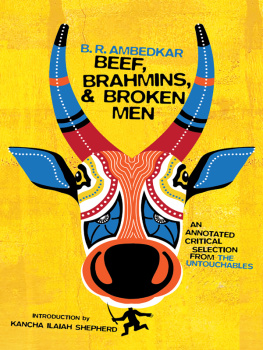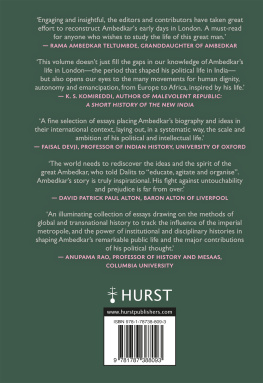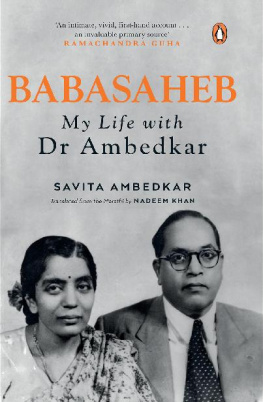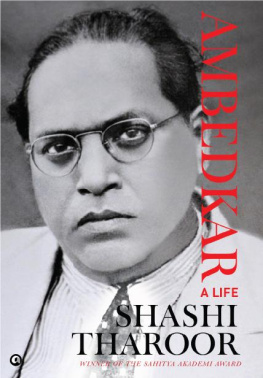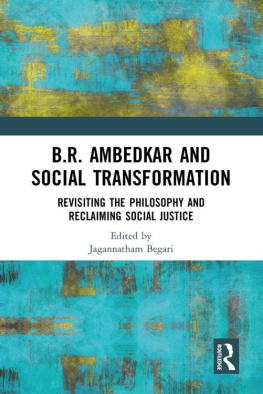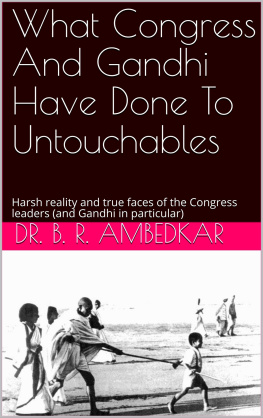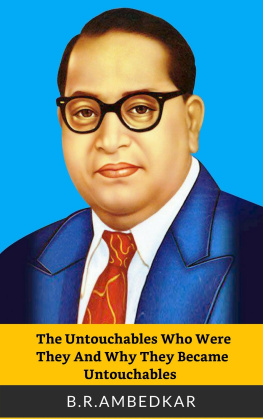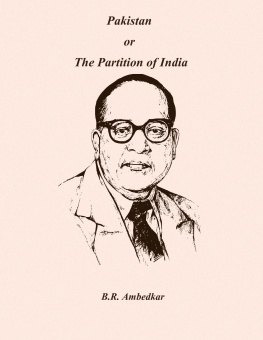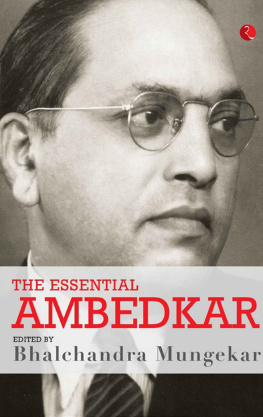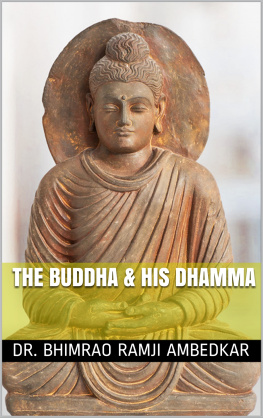Table of Contents
Beef, Brahmins, and Broken Men
Beef, Brahmins, and Broken Men
An Annotated Critical Selection
from
The Untouchables
B.R. Ambedkar
Edited and annotated by Alex George and S. Anand
Introduction by Kancha Ilaiah Shepherd
Columbia University Press
New York
Columbia University Press
Publishers Since 1893
New York Chichester, West Sussex
cup.columbia.edu
Beef, Brahmins, and Broken Men: An Annotated Critical Selection from
The Untouchables
First published by Navayana Publishing Pvt Ltd
ISBN 9788189059915
Annotations and this edition 2020 Navayana Publishing Pvt Ltd
All rights reserved
E-ISBN 978-0-231-55151-9
The Untouchables: Who Were They and Why They Became Untouchables? was first published in 1948 by Amrit Book Depot, Delhi
Library of Congress Cataloging-in-Publication Data
Names: Ambedkar, B. R. (Bhimrao Ramji), 18911956 author. | George, Alex, editor. | Anand, S. (Journalist), editor. | Ilaiah, K. (Kancha), 1952 author of introduction.
Title: Beef, brahmins, and broken men : an annotated critical selection from the Untouchables, who were they and why they became untouchables? / B.R. Ambedkar ; edited and annotated by Alex George and S. Anand ; introduction by Kancha Ilaiah Shepherd.
Other titles: Untouchables. Selections. Annotated critical selection from the Untouchables, who were they and why they became untouchables?
Description: Shahpur Jat, New Delhi : Navayana ; [New York] : Columbia University Press, 2019 | Includes bibliographical references and index.
Identifiers: LCCN 2019036120 (print) | LCCN 2019036121 (ebook) | ISBN 9780231195843 (cloth) | ISBN 9780231195850 (paperback) | ISBN 9780231551519 (ebook)
Classification: LCC DS422.C3 A742 2019 (print) | LCC DS422.C3 (ebook) | DDC 305.5/688095475dc23
LC record available at https://lccn.loc.gov/2019036120
LC ebook record available at https://lccn.loc.gov/2019036121
A Columbia University Press E-book.
CUP would be pleased to hear about your reading experience with this e-book at .
[Ambedkars dedication, 1948]
Inscribed to the memory of
NANDNAR
RAVIDAS
CHOKHAMELA
THREE RENOWNED SAINTS WHO WERE BORN AMONG THE UNTOUCHABLES AND WHO BY THEIR PIETY AND VIRTURE WON THE ESTEEM OF ALL
Contents
Kancha Ilaiah Shepherd
S. Anand and Alex George
Alex George and S. Anand
Kancha Ilaiah Shepherd
We would have felt proud if the Vice Chancellor has told that we were suspended because we organized Ambedkar Vardhanthi, Babri Masjid demolition day and Beef festival in the last week. Anyways, this is not the first. Assertion of Dalits has been met with these kind of cunning suppression all over IndiaIts Christmas month, resurrection is more than likely in this season.
Rohith Vemula, 18 December 2015, Facebook post
In April 2012, a beef-themed food festival was organized by the Dalit students of Osmania University in Hyderabad. This was a good two years before the Bharatiya Janata Party (BJP) took control of the Indian parliament with Narendra Modi as prime minister with the brazenly stated religious agenda called Hindutva that is at odds with the Constitution, and seven years before it renewed its pincer-like hold on state and society in May 2019. The festival was part of B.R. Ambedkars 121st birth anniversary celebrations, in which Dalit, Shudra, Adivasi and Muslim students, teachers and other social and political activists participated. Beef biryani was served in plenty, and the pure vegetarian nationalism propagated by the right-wing Brahmanic forces was collectively challenged. The public and celebratory consumption of beef was and is projected as anti-Indian by the right wing. A food item turned into an object of stigma and shame was being reclaimed as a symbol of pride, as a right. The purpose of the Osmania University beef festival was equally to declare that those opposed to beef were anti-human. About fifty members of Akhil Bharatiya Vidyarthi Parishad (ABVP), the students wing of the BJP, stormed the venue and attacked the organizers and beef-eaters. The BJP was not a significant player in the southern state in 2012 and yet they could will their way to gratuitous violence. Five people were injured in the scuffle that ensued.
Beef stalls, as they are called, have been successfully put up at the annual cultural festivals of all three major universities in Hyderabad, the city where I have lived and taught most of my professional life. In April 2011, the English and Foreign Languages University in the city saw fights break out over a beef festival in celebration of Ambedkars birth anniversary by the Dalit Adivasi Bahujan Minority Students Association (DABMSA) and the Telangana Students Association (TSA). This festival was also attacked by the ABVP. A news report said:
According to members of DABMSA and TSA, the ABVP activists barged into the campus kitchen, threw down the vessels in which the beef was cooked, and desecrated the food. The next day, beef supporters initiated a food bandh on campus, closing down the messes, canteens and stores and demanding inclusion of beef in the menu. They said that no food would be available on campus if their demands were not met (Thomas 2011).
students come up with stalls that served beef biryani, known locally as Kalyani biryani. The Kalyani variation of the meat-and-rice dish, that Hyderabad is reputed for, has an antiquity of some three hundred years. It is known for its distinctive flavouring of cubes of beef with tomato, cumin and coriander. It is no coincidence that Rohith Vemula was part of the Ambedkar Students Association (ASA) that organized a beef festival. The date chosen was 6 December. It marks both Ambedkars death anniversary and the day the Babri Masjid (a sixteenth-century mosque in Faizabad district, Uttar Pradesh) was demolished by coordinated right-wing militia under the aegis of Hindutva forces in 1992.
The epigraph to this introductory essay makes it clear why Rohith Vemula was forced to his death by a state that had declared war on young Dalit men and women who had dared to organize beef parties and question the whims of the state (see #Caste Is Not a Rumour: The Online Diary of Rohith Vemula [2017], a compilation of his key Facebook posts from 2008 to January 2016).
Rohith and four other Dalit studentsVijay Kumar P., Seshu Chemudugunta, Sunkanna Velpula, and Dontha Prashanth, all members of the Ambedkar Students Associationwere suspended for allegedly assaulting an ABVP student leader on campus. Bandaru Dattatreya, a BJP member of parliament, and then Union Human Resource Development Minister Smriti Irani (whose portfolio included education) were proactively involved in suspending the anti-national Dalit students. After being forced out of their hostel rooms and being denied access to libraries, the five Dalit students pitched a makeshift tenta veliwada in Teluguon campus, in the university shopping complex. It was made of life-size vinyl-printed posters of anti-caste thinkers, poets and activists from across the subcontinentBuddha, Kabir, Gurram Jashuva, Ambedkar, Kanshi Ram, Savitribai Phule, Jotiba Phule, Ayyankali and Periyar.
On 17 January 2016, Vemula left behind a powerful suicide note entitled My birth is my fatal accident, indicting the university authorities and the world at large, and took his own life in a friends room. He hanged himself with the ASA banner. In the wake of protests and demands for justice for Rohith that spread across India and the international community of scholars and intellectuals, Kailash Vijayvargiya, a senior BJP leader in Delhi, had this to say: One who protested against the execution of terrorists, one who said he feels like sin whenever he sees saffron colour,



